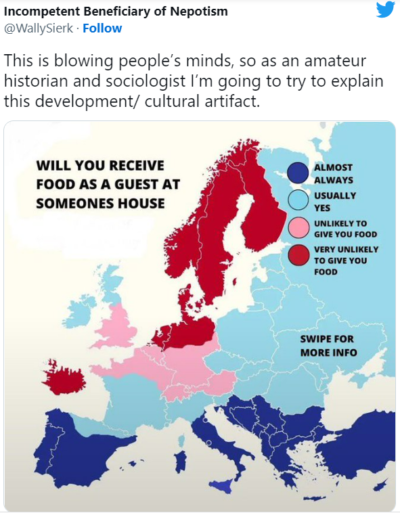How will we feed 10 billion people without destroying the planet? Will it be lab-grown meat? What if it was human flesh? The documentary ‘Eat a Swede‘ portrays an entrepreneur seeking funding. The idea? Lab meat, but with one detail, the cells multiplied are human.
Eat a Swede
‘Eat a Swede’ (you can watch it in full, it’s this video above!) is actually a “mockumentary”, that is, a pseudo-documentary. The investors and test volunteers, however, are real and their reactions are genuine, hence the realism that the story conveys. The Swedish Food Federation, the entity behind the production of the video, actually calls attention to how to feed a growing population in a sustainable way. They also publicly make a series of environmental commitments for the coming years, such as becoming a fossil fuel-free industry and cutting food waste in half, and asking everyone to collaborate to achieve these goals. The final message is “don’t eat a Swede, eat like a Swede”.
In addition to the sustainability issue, there is a lot to be discussed in this pseudo-documentary. The federation itself states on its website that while they don’t think that lab-grown human meat is a good idea, they welcome all sorts of innovations and new technologies that can bring them closer to the goal of sustainable meat production. foods.
The cultural aspect
Tkinking of cannibalism is shocking. I don’t know of any other food taboo as big as this one, in all countries and social classes the repulsion is the same. And I already made a post about products made with blood (read here)! It’s funny that the documentary presents some arguments that are well known to everyone, such as the issue of cell donor consent and the branding needed to make the idea take off.
He talks about the “perfect” composition of amino acids that we need, that it’s not a human being itself, it’s cells from a donor, and that eating a pig might be shocking, but eating bacon doesn’t cause that sensation. Are we aware of what we eat today? And if so, how many would still eat in the name of perfect healthiness or to achieve the “perfect” body?
Is all worth for the “perfect body”?
Thinking further, in a dystopian future where it is proven that the perfect composition of meat is ours, how many people would be willing to eat this product? Is all worth for the “perfect” body? Can the industry produce any sustainable product and invest millions in advertising that we will start eating without questioning it?

Kim Kardashian said she would even eat poop every day if it made her look younger. In this photo, she is given the “vampire face” treatment, which involves taking blood from her arm and injecting it into her skin to stimulate cell turnover.
When we take nutrition away from food, we all lose, because we don’t eat amino acids and carbohydrates, we eat meat and rice, we don’t eat nutrients, we eat food. The food industry doesn’t have to be the villain, when done right, food production on an industrial scale can be efficient, sustainable and responsible.
Speaking about Swede…
By the way, as we are speaking about Swedes, their habits were recently the subject of discussion on social media when a post on Reddit asked “What’s the weirdest thing you’ve had to do at someone else’s house because of their culture/religion? “. One user mentioned that he had to wait at his friend’s house while the friend’s family had dinner. The report ended up on Twitter and provoked inflamed reactions from netizens of different nationalities.

A map (without scientific rigor!) illustrating the probability of you being fed if you are visiting someone’s house in Europe.
While in some cultures sharing food and eating together reinforces proximity, some have argued that feeding someone else’s children can embarrass the family, as the family has food at home and the act can create a kind of debt of gratitude. In Saudi Arabia, a video was released to get people to stop urging census officials to come in and eat with them. Some scholars argue that this hospitality, sometimes even excessive, is related to memories of deprivation from the past. “Societies often remember poverty, scarcity and abstinence for excessive generosity, gifts and hospitality as compensation.”
We do not want just food
This is just one more example that even the most widespread habits among us can be different in other places and that even if food made in a laboratory one day can generate any food, we are not free from the cultural aspect. Culture is much more nuanced than what we see on the surface and this impacts the products we develop. Keeping this in mind is extremely important when developing new products.
Sources: The Drum, NDTV, NPR, Insider


















